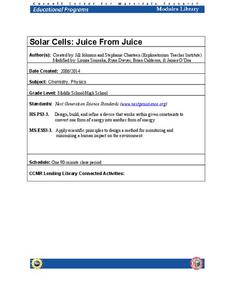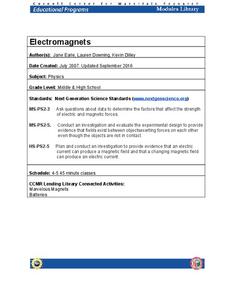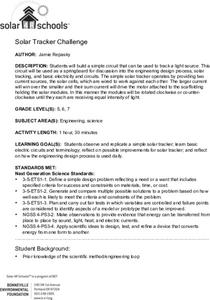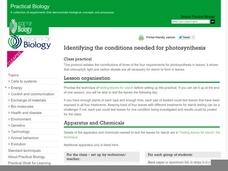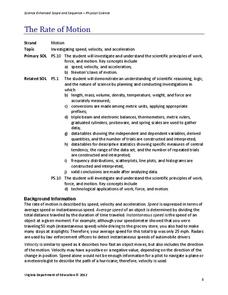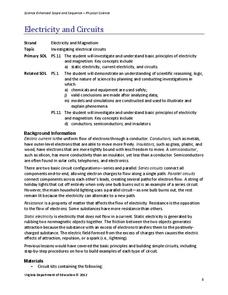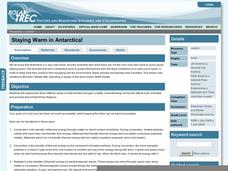Baylor College
Digestion
Digestion is an amazing and complicated process that provides humans with the energy they need to survive. Lesson six in this series on the science of food uses sliced turkey and a meat tenderizer to demonstrate how enzymes help break...
Purdue University
Field Trip Snack Holder
Is light related to insulation? An informative hands-on STEM activity demonstrates how light affects temperature. First, the class investigates how light passes through different mediums and how that relates to temperature. Then,...
Micron Technology Foundation
Electricity
Conduct four electrifying electricity experiments that challenge young scientists to explore positive and negative charges and magnetic fields without the shock.
Rochester Institute of Technology
Heat Transfer
Use an exciting role play activity to teach young chemists about the importance of heat transfer in maintaining homeostasis. They assume the role of a dog sled owner who has been abandoned and must fend for themselves with only a few...
Virginia Department of Education
The Particle Theory of Matter
Demonstrate the particle theory of matter to high school scientists with an engaging experiment that allows them to visually see the results as substances change from one state to another. The class concludes with a discussion about how...
Pace University
Grade 6-8 Living Things
What characterizes a living thing? Scholars explore the concept during a differentiated instruction unit on living things. They perform lab experiments to determine how animals adapt to stimuli, watch videos and learn about...
Cornell University
Solar Cells: Juice From Juice
Unleash the power of ... blackberries! Science superstars create solar cells using the juice of berries or leaves of a citrus tree in an engaging lab. In addition to offering a plethora of resources, the teacher's guide gives background...
Science Matters
Digestion: Chew on That
When your mom tells you to chew your food, you really should listen! A lesson on the digestive system examines the first step of digestion that happens in the mouth. Learners check crackers and use iodine to highlight changes in the...
Purdue University
Can You Design a Hot or Cold Pack?
You're getting warmer. Groups conduct an experiment to determine which of four chemicals are in hot/cold packs. They learn about exothermic and endothermic reactions and use this knowledge to design a hot/cold pack that is small enough...
Bonneville
Can Portable PV Charge Vehicles?
Take charge of learning about electric vehicles. Instructors first provide the class with information about PV modules and batteries. Learners then conduct an experiment where they connect PV modules in series and in parallel to...
Bonneville
Designing a Solar Charger
The sun can even charge batteries. The fourth of five lessons in the Solar Transportation unit has pupils design a charger that uses solar modules to charge a 12-volt lead-acid battery. They estimate the charge that accumulates and...
Consumers Energy
Circuits and the Flow of Electricity Lesson Plan
I think I lost an electron. Are you sure? Yes, I'm positive! Starting with a hands-on demonstration and problem solving activity, young scientists define vocabulary related to circuitry and currents. Then they build their own circuits...
Virginia Department of Education
States of Matter
Scientists have been studying exothermic reactions before they were cool. The lesson begins with a discussion and a demonstration of heat curves. Scholars then determine the heat of fusion of ice and the heat needed to boil water through...
Space Awareness
Water is a Heat Sink
One of the key objectives of Europe's Copernicus Earth program is to monitor the temperatures of the oceans and seas on Earth. Young scholars learn the effects of different heat capacities through two experiments. These experiments...
Cornell University
Electromagnets
Discover the connection between electric current and magnets. Scholars create electromagnets by passing a magnet through a coil. They experiment with different materials to determine the variables that affect the strength of the current.
Bonneville
Macro-Scale Solar
There's no substitute for the power of the sun. The second of four installments of the Solar Resources Assessment unit looks at macro-scale photovoltaic (PV) technology. Future scientists first learn about PV modules with a PowerPoint...
Bonneville
Solar Tracker Challenge
Follow the light—not with one's eyes—but with a special solar tracker. Future engineers design and build a device that tracks light. They must build circuits in which solar cells rotate to receive equal amounts of light.
Bonneville
Solar Powered Water Pumping
Here's the perfect lesson for those who think the world needs faster pumps. Building on the previous activity, scholars work to make the pumps function faster in transferring water between containers. They try adding an additional solar...
Nuffield Foundation
Measuring the Rate of Metabolism
Plant respiration can be a difficult concept for young biologists to grasp; with a hands-on lab, learners can collect and graph data, then calculate the metabolism rate for the plants they studied. If you do not have a respirometer,...
Nuffield Foundation
Identifying the Conditions Needed for Photosynthesis
Budding biologists often ask how scientists know what they do about different topics. In the lab described here, they have a chance to find out first-hand about the requirements for photosynthesis. Three sequential investigations are...
Virginia Department of Education
The Rate of Motion
How much time does it take to jump over three balloons? Pupils calculate the speed of tasks that require different motions. They determine motions for tasks such as walking, skipping, hopping, and jumping before creating a spreadsheet...
Virginia Department of Education
Work and Power
Assist your class with correctly calculating the values for force, work, and power as they determine the amount various activities require. They gather data and participate in a group discussion to compare results upon conclusion of the...
Virginia Department of Education
Electricity and Circuits
Electrify your classroom as you lead pupils through a series of steps to demonstrate basic principles of electricity and magnetism. They design a simple circuit and test this for static electricity and current electricity. Next, they...
Polar Trec
Staying Warm in Antarctica!
Has your class ever wondered how animals and scientists stay warm in the Polar Regions? Kids will investigate to understand the three types of heat transfer and how heat transfer affects those trying to stay toasty in sub-zero...
Other popular searches
- Potential and Kinetic Energy
- Energy Pyramid
- Renewable Energy
- Energy Transformation
- Forms of Energy
- Kinetic Energy
- Energy Transfer
- Thermal Energy
- Heat Energy
- Solar Energy
- Solar Power
- Potential Energy








